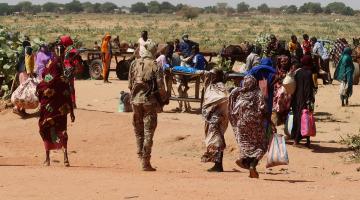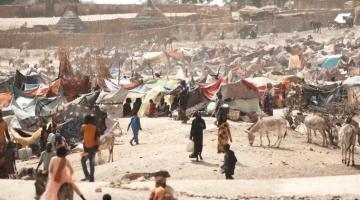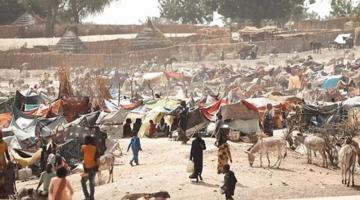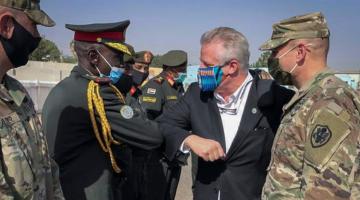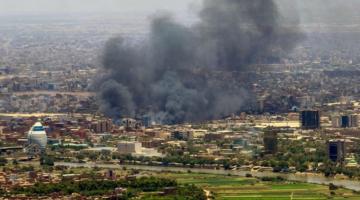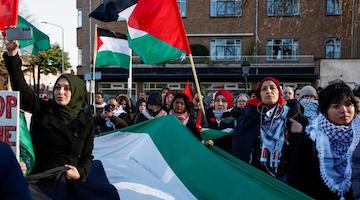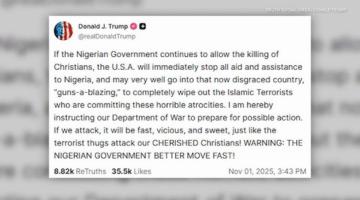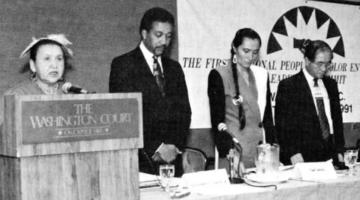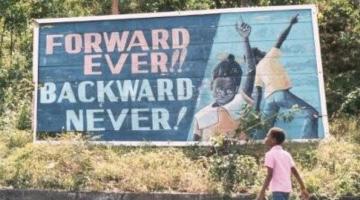This image taken from video released on the RSF Telegram account on October 26, 2025, shows RSF fighters holding weapons and celebrating in the streets of el-Fasher [Screengrab/AFP]
The world's worst humanitarian crisis just found a new epicenter. The capture of El-Fasher signals the start of a worsening chapter in the history of Sudan.
The capture of El-Fasher, North Darfur, by the United Arab Emirates (UAE)-backed Rapid Support Forces (RSF) on October 26, 2025, marks a catastrophic turning point in Sudan's civil war and signals a chilling continuation of the region's decades-long pattern of ethnic cleansing. With over 260,000 civilians trapped in the besieged city, the fall of the Sudanese Armed Forces' (SAF) last major stronghold in Darfur has immediately led to horrifying reports of mass executions, widespread displacement, and the deepening of a humanitarian crisis already considered the world's worst.
The Historical Significance of El-Fasher
El-Fasher is more than just a capital city; it is the historic capital of the Darfur Sultanate and a critical gateway connecting Sudan to Central and West Africa. Its strategic and symbolic importance is immense. The city has long been a haven for Internally Displaced Persons (IDPs) since the first Darfur war erupted in 2003, when the Janjaweed militias—the direct precursor to the RSF—unleashed a campaign of terror against non-Arab indigenous groups.
The 2003 rebellion was launched by the Darfur liberation movements—primarily composed of non-Arab indigenous groups like the Masalit, Zaghawa, and Fur—as a response to decades of marginalization from Khartoum and the preferential treatment given to Arab nomadic groups, allowing them to encroach upon indigenous agricultural lands. The city's fall to the RSF, a group directly tied to the perpetrators of the 2003 genocide, sends a profound and terrifying signal to the region's non-Arab population.
The Evolution of the Darfur Movements' Stance
Following the removal of then president Omar al-Bashir in 2019, the Juba Peace Agreement (JPA), was signed. Key signatories included Darfur liberation movements led by Minni Minawi’s Sudan Liberation Movement/Army (SLM/A) and Jebril Ibrahim’s Justice and Equality Movement (JEM), who aligned with the transitional government, which then included both SAF and RSF.
When the war between the SAF and RSF broke out in April 2023, these Darfur movements initially adopted a stance of neutrality, calling for a ceasefire and establishing the Darfur Joint Protection Force to safeguard civilians. However, this neutrality was shattered after the RSF committed a brutal campaign of ethnic cleansing against the Masalit group in El Geneina, West Darfur, resulting in mass killings and displacement.
By November 2023, four of the Darfur Joint Forces movements, including JEM and SLM/A-Minawi, reluctantly renounced their neutrality and aligned themselves with the SAF—the very army that had orchestrated the genocide against them two decades earlier. This move, driven by the clear genocidal intent displayed by the RSF, pitted former victims alongside their former tormentors against a common, more immediate existential threat.
The Siege and Humanitarian Catastrophe
Since the war's start, the RSF gained control of four out of Darfur's five states, with North Darfur, and specifically El-Fasher, remaining a partially contested zone. As the SAF gained ground in central states like Khartoum and Gezira in early 2025, fears escalated that the RSF would pivot to take Darfur in its entirety to offset their losses.
The intensification of the El-Fasher siege began in early 2025, demonstrating a clear intention to consolidate control over the entire Darfur region. The humanitarian impact has been devastating.
In April 2025, the RSF attacked Zamzam Camp, Sudan's largest IDP settlement on the outskirts of El-Fasher, which was home to an estimated 500,000 residents as recently as early 2025. Reports from April 2025 indicated that the RSF launched a massive ground assault, resulting in the killing of civilians and the burning of parts of the camp to the ground. Humanitarians noted that the population had already plummeted by 70%—from 700,000 in March to 200,000 in September—with thousands of families forcibly displaced again, many fleeing south to Tawila, which now hosts around 600,000 displaced people (ReliefWeb/UN News, October 2025). The camp’s residents, already starved and shelled, were subjected to further ransacking and violence.
The 18-month siege has led to a severe humanitarian blockade. By October 2025, at least 20 civilians were reportedly killed in RSF attacks targeting the last remaining hospital and a mosque in El-Fasher, where IDPs sought refuge, highlighting the indiscriminate nature of the violence.
The Fall of the Sixth Division and Immediate Atrocities
The ultimate prize for the RSF was the SAF's 6th Infantry Division base in El-Fasher. Its fall on October 26, 2025, confirmed the city's takeover and signaled that the RSF now effectively controls the entire Darfur region, fulfilling the analysts' warnings of a potential partition of Sudan.
In the immediate aftermath, reports of atrocities were widespread. The Sudan Doctors Network claimed dozens of people were killed in a "horrific massacre... in a crime of ethnic cleansing" following the RSF's capture of the military base. The International Organization for Migration (IOM) reported that between 2,500 and 3,000 individuals were displaced from the town on October 26 alone, with thousands more displaced in the preceding days. Videos, though difficult to verify due to a telecommunications blackout, circulated online, allegedly showing RSF fighters berating and executing men they accused of being soldiers.
Geopolitical Dimensions and the "Quad"
The timing of El-Fasher’s fall seems to be directly linked to ongoing indirect peace talks facilitated by the "Quad," which consists of the US, UAE, Saudi Arabia, and Egypt. The talks are primarily aimed at securing a three-month humanitarian truce and a permanent ceasefire.
The main broker for the US in these negotiations is Massad Boulos, a Lebanese-American businessman and senior advisor to President Donald Trump on Africa, and also his youngest daughter’s father-in-law. Boulos, who has no known prior experience in Sudanese conflict resolution, has led the talks based on a Quad-devised roadmap that includes halting foreign assistance to the warring parties.
Many analysts view the RSF's takeover of El-Fasher as a strategic move encouraged by the UAE to strengthen the RSF’s bargaining position. The UAE has been repeatedly accused of providing direct military support to the RSF, often under the cover of humanitarian missions—allegations the UAE denies, but which a UN Panel of Experts has deemed "credible.”
By securing complete control of Darfur—a region that borders South Sudan, the Central African Republic, Chad, and Libya—the RSF and its external benefactors gain control over a vast and strategically crucial area. This consolidation is seen by some as an explicit manifestation of a broader neocolonial order where Zionist-aligned regional powers seek to control the security and economy of African states, potentially cementing a political partition of Sudan. The RSF's new regional government, backed by the UAE, gains a powerful lever in any future negotiations, making a sustainable, just peace an increasingly distant prospect for the non-Arab people of Darfur
Mosaab Baba is a founding member of the Pan-African Forum - Sudan, and previously a member of the Girifna movement in Sudan. In recent years Mosaab has been a lead consultant for the Ayin Network, as well as working with the new civic actors after the 2019 revolution.

